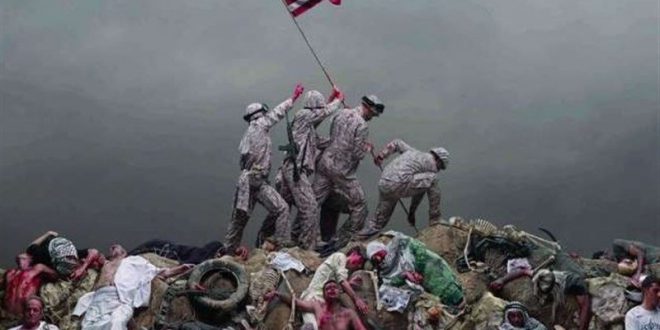| By Leila Yazdani: The US assassination of a top Iranian military leader, Qasem Soleimani, in an airstrike in Baghdad’s international airport has raised legal questions. At the heart of public concern is this question: Was the drone strike legal? If so, on what basis? In the Pentagon’s statement released after the strike, it said the targeting of Soleimani came by order of Trump as a way of “deterring future Iranian attack plans”. An imminent attack, is this really something Trump was authorized to do?
Donald Trump’s decision to carry out a lethal targeted strike against an Iranian General has renewed an international legal debate about the line between warfare and assassination that has never fully been resolve. The US’s practice of targeted killing has long been under question in international law circles.
The targeted killings of Qasem Soleimani and Abu Mahdi Al-Muhandis are most likely unlawful and violate international human rights law: Outside the context of active hostilities, the use of drones or other means for targeted killing is almost never likely to be legal. UN Rapporteur on extra-judicial executions Agnès Callamard tweeted, according to CNN.
The premeditated killing of a specific individual commander for what they have done on the battlefield or what they may do has been prohibited by the law of armed conflict dating from the Hague Conventions of 1907, and by a protocol of the Geneva Convention in 1949 saying it is prohibited to kill, injure or capture an adversary by perfidy, Japan Times told.
The targeted attack on Soleimani, resembles a World War II strike on Japanese Adm. Isoroku Yamamoto, the architect of Pearl Harbor. After U.S. intelligence learned he would be flying in the Solomon Islands area, they sent Air Force fighters to shoot down his plane in an attack code-named “Operation Vengeance”.
In the past, the US had defended its targeted killings against members of groups including the Taliban, al-Qaeda and the Islamic State group under the argument that they are non-state armed actors engaged in conflict with the US. The US holds that it can target non-state actors anywhere, even on another country’s land without their permission. But, in this case the US has assassinated the state actors.
An act of aggression against Iran
The ICC uses a definition of aggression derived from international customary law, which generally prohibits the invasion or attack with a state’s armed forces against the territory of another state—including through bombing a state, blockading its ports and coasts, or sending irregular/partisan/paramilitary forces to accomplish the same.
There are two important ICC definitions of aggression that are relevant here. First, an act of aggression can be, “an attack by the armed forces of a State on the land, sea or air forces, or marine and air fleets of another State”—in other words, attacking another state’s military.
The assassination of Soleimani would seem to fall under this definition, as he was a high-ranking military official in Iran. This definition of aggression is broad enough to cover a lone MQ-9 Reaper drone executing a general of another state’s armed forces. The second important definition from the ICC identifies aggression as, “the use of armed forces of one State which are within the territory of another State with the agreement of the receiving State, in contravention of the conditions provided for in the agreement or any extension of their presence in such territory beyond the termination of the agreement.”
In other words, armed forces lawfully in a third party’s country suddenly acting unlawfully and in breach of the agreement may constitute aggression. This is relevant, as U.S. forces are only lawfully in Iraq by invitation of the Iraqi government—and the Iraqi Prime Minister has already described the attack as a “flagrant violation of the conditions authorising the presence of US troops” on Iraqi soil. Under two distinct ICC descriptions, then, the U.S. likely committed an act of aggression against Iran in assassinating Soleimani.
Breach of Iraq’s sovereignty
Some legal experts questioned whether Trump had the legal authority to target Soleimani on Iraqi soil without the permission of Iraq’s government, and whether it was legal under international? US military’s presence in Iraq is allowed by the Iraqi government only under certain conditions. So, US actions violated Iraq’s sovereignty.
A strategic framework agreement signed in 2008 between Washington and Baghdad called for close defense cooperation to deter threats to Iraqi “sovereignty, security and territorial integrity” but prohibited the United States from using Iraq as a launching point for attacks on other countries.
Iraq’s prime minister said Washington had violated a deal for keeping U.S. troops in his country, and several Iraqi political factions united in a call for American troops to be expelled. The absence of consent from Iraq makes it difficult for the United States to justify the killing.
Self-Defence or assasssination
Was U.S. killing of Iran’s Soleimani self-defense or assassination?
Trump said he ordered the attack to “prevent a war”, not as part of an on-going armed conflict with Iran. He also used terms relevant to a case for self-defense under the jus ad bellum. The UN charter, which prohibits a state from unilaterally resorting to the use of force against another state, also allows for an exception in cases where the state has been the subject of an armed attack.
Outside of an on-going armed conflict, the first use of military force is regulated under the jus ad bellum. The first principle of the jus ad bellum is the prohibition on the use of force, a peremptory norm codified in United Nations Charter Article 2(4). The only possible exception to the prohibition applicable in this case is self-defense. The exception is narrow.
Article 51 of the Charter of the United Nations prohibits the use of force except under two circumstances: when the use of force was authorised by the UN Security Council and when a country acted in self-defence. The United States used the article to justify taking action in Syria against Islamic State militants in 2014.
Article 51 only permits self-defence in response to an attack that has already occurred or is underway. Absent evidence of such an extraordinary attack against the United States, “anticipatory” self-defence, Pompeo’s stance that the killing was a “defensive action,” cannot be legally justified, Commondreams mentioned. But there are some huge loopholes in those claims.
First, if there actually was an “imminent” threat to US interests in the region, then removing Soleimani doesn’t remove that threat, Business Insider said.
Second, Additional reporting from The New York Times‘ Rukmini Callimachi indicated that even the underlying intelligence the Trump administration has cited as necessitiating the strike against Soleimani is “razor thin.”
Third, One legal expert told the Washington Post that the phrase ‘imminent threat’ did not appear in the Pentagon’s initial statement, suggesting “the lawyers realized that they had a problem on their hands.”
Yale Law School professor Oona Hathaway, an international law expert, said on Twitter that the available facts “do not seem to support” the assertion that the strike was an act of self-defense.
Human rights law
Killing General Soleimani constitutes a Human Rights Violation. UN Rapporteur on extra-judicial executions Agnès Callamard argued that “drone killing of anyone other than the target (family members or others in the vicinity, for example) would be an arbitrary deprivation of life under human rights law.”
Conservative commentator Robert Kagan warned in a book published last year, bemoaning America’s withdrawal as an enforcer of international law, a notion challenged by an array of critics, that chaos was the world’s historical norm. “The jungle will grow back, if we let it,” Mr. Kagan argued, Eurasia Review mentioned. Nowdays, the jungle rather than the rule of law threatens to become the norm, putting the global community on a dangerous and slippery slope.
 صراط عشق صراط عشق
صراط عشق صراط عشق




